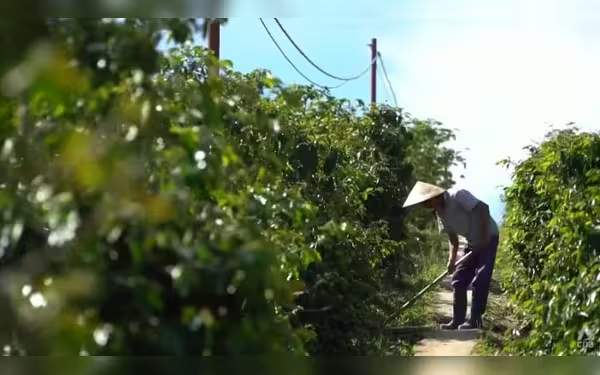Sunday, October 6, 2024 12:30 AM
Climate Change Threatens Global Coffee Supply
- Climate change endangers coffee crops in Southeast Asia.
- Rising temperatures lead to reduced yields and quality.
- Economic impact expected as coffee prices rise.
 Image Credits: channelnewsasia
Image Credits: channelnewsasiaClimate change poses a serious threat to the global coffee supply, particularly in Southeast Asia, impacting production and prices.
Every morning, millions of people around the world find comfort in a warm cup of coffee. This beloved ritual, however, is facing serious challenges due to climate change. As temperatures rise and weather patterns become unpredictable, the coffee supply is at risk, particularly in Asia, where major coffee producers like Vietnam and Indonesia are located. These countries are not just significant players; they rank as the second and fourth largest coffee producers globally, respectively.
In 2023, Vietnam produced an impressive 29.1 million 60kg bags of coffee, while Indonesia contributed 11.85 million bags. Other nations in Southeast Asia, such as Thailand, Laos, and the Philippines, are also stepping up their coffee production. Yet, the increasing temperatures, erratic rainfall, and prolonged droughts are wreaking havoc on coffee crops. Coffee plants are particularly sensitive to changes in climate, and the rising heat can stunt their growth, reduce yields, and compromise the quality of the beans.
Moreover, pests like the coffee berry borer thrive in warmer conditions, further complicating the situation and leading to significant crop losses. Experts warn that by 2050, up to 50 percent of land suitable for coffee cultivation could be lost due to climate change. The Coffee Belt, which lies between 20 degrees north and 30 degrees south of the equator, is home to many key coffee-producing regions and is among the most vulnerable to these climatic shifts. This vulnerability poses a growing threat to the global coffee supply.
The long-term implications for the coffee industry are alarming. As climate conditions deteriorate, the supply of coffee from Southeast Asia and other vital regions is expected to decline. This reduction in supply comes at a time when global demand for coffee is on the rise, fueled by population growth and the beverage's popularity as a health-enhancing stimulant in our fast-paced lives. The Global Coffee Market is projected to grow at a Compound Annual Growth Rate of 5.4 percent from 2024 to 2032.
Economic consequences are unavoidable. As coffee yields decrease, prices are likely to rise, affecting the entire market. For instance, the price of robusta coffee has nearly doubled since early 2023, primarily due to drought conditions in Vietnam. While some coffee producers may see short-term benefits from higher prices, the long-term outlook remains grim. Ongoing climate challenges could make coffee farming unsustainable, forcing small farmers to abandon their crops.
The future of coffee is uncertain, and the implications of climate change extend beyond just the farmers and producers. As consumers, we must recognize the impact of our choices and advocate for sustainable practices that protect our beloved coffee. By supporting environmentally friendly coffee brands and being mindful of our consumption, we can contribute to a more sustainable future for this cherished beverage. After all, every cup of coffee tells a story, and we must ensure that story continues for generations to come.













